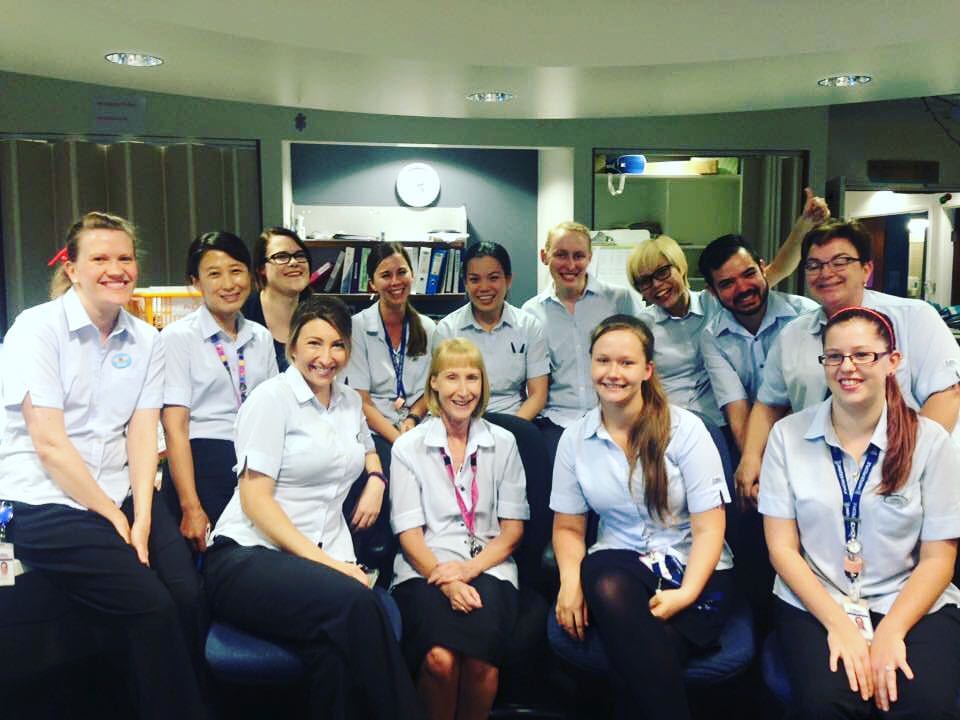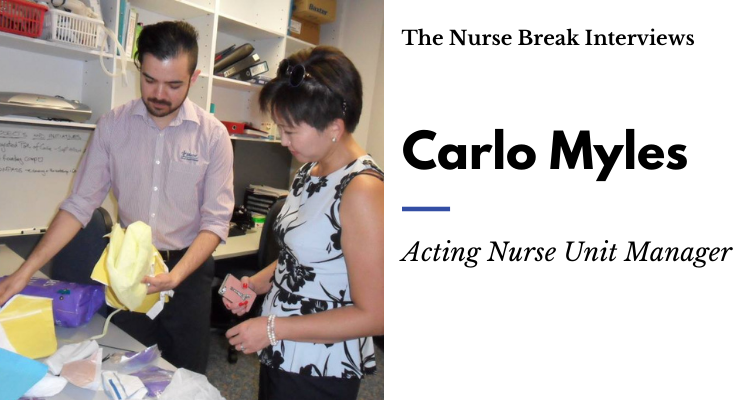Table of Contents

Tell us about yourself + How did you enter into nursing and why?
Hi, my name is Carlo Myles and I am currently Acting Nurse Unit Manager of a Young Adults inpatient unit and two sleep studies units in Brisbane. I was always in the arts in high school – drama, visual arts and music, so wanted to pursue this in university studies, but my mother, who worked in the state government department of employment & training at the time, convinced me to look into skill shortage areas for job longevity and security, and I felt that nursing aligned to my personality the most.
Where do you currently work and what inspired you to work in this field?
I currently work in the young adult and adolescents setting in a tertiary hospital. I enjoy supporting patients who are similar ages to me to manage their long term medical conditions. I enjoy mentoring and growing the capacity and capabilities of emerging clinicians too.
I am lucky to have been nurtured from a 19-year-old graduate Enrolled Nurse to a 33-year-old Nurse Unit Manager in the same workplace. Whilst I have worked for different organisations before and during my tenure at my current employer, I have been fortunate to have “grown-up” and evolve with my organisation.
You are the NUM of a Young Adults Med-Surg Inpatient Unit and a Sleep Unit!
So I actually manage three separate units, a young adult’s medical-surgical unit, a sleep studies unit that cares for insured patients, and a sleep studies unit for both insured and non-insured patients. They are run quite differently from each other and involve a number of different interdisciplinary professionals to run well. The young adults unit often cares for patients with cystic fibrosis, diabetes and inflammatory bowel diseases, who also care for patients undergoing urology, orthopaedic and general surgical procedures who are aged 16-30 years old.
As a NUM what does a typical day look like for you?
My typical day includes receiving general handover at the safety huddle, ensuring the units are adequately staffed for the following shifts, liaising with the interdisciplinary healthcare team regarding patients’ journeys, some direct patient care, supporting the team leaders with patient admission and discharge flow, rostering, investigating clinical incidents, recruiting new staff and providing mentorship to emerging clinicians
What are some of the challenges you face?
I am very new to being a NUM, so my biggest challenge is not to have the total mindset of a clinician anymore, and to think about the big picture operationally. I truly believe in “if you talk the talk, you must walk the walk”, my team knows that I would never ask them to do something that I wouldn’t do first. It’s very important to me to have clinical credibility, but also to have the tough conversations when needing to.
What is your leadership style?
I align with the coaching-style of leadership as it harnesses the individual strengths of the team members. I actively encourage my colleagues to seek opportunities to stretch themselves like team-leading a shift, precepting new starters and students or following postgraduate qualifications in specialities of interests.
Can you tell us about your time as a clinical facilitator?
If I weren’t a nurse, I think I would be a teacher; so clinical education and facilitation are the best of both worlds. I can’t physically nurse every patient in the world, but I can influence how a group of clinicians nurse, and then they can influence the next group and so on. It is very rewarding when you see it in action. I have seen the ‘lightbulb’ moments. The most common area I see nurses struggle with (and that goes for me too) is self-care. We give a lot, but always forget to look after ourselves.
What is an asthma educator?
I was working as a Respiratory Clinical Nurse and felt that I needed more skill in how to support Asthma sufferers in managing their chronic condition. I did the four-day workshop through the Alfred and it was so enlighting. I would like to use the skills in that course to establish myself as a consultant/ practitioner in the chronic disease management space one day.
You are also interested in Young Men’s Health?
As both a consumer and clinician, I have seen there are still gaps in young adults, particularly men seeking advice and treatment around emotional health, chronic disease management, sexual & reproductive health, vaccine-preventable diseases and skin health. I hope to raise the profile of these areas through my work, my volunteering and my studies.
Please tell us about your interest in the evolving the scope of practice of EN’s?
I was an EN in 2006, and the scope of practice I held then, in comparison to the scope of practice of my colleagues now, is so wide and diverse. I am enjoying advising Registered Training Organisations around making their diploma courses contemporaneous and relevant.
You are now doing a Masters in Quality and Safety. How have you found postgraduate study?
I’ll be honest. It is very challenging getting the balance in your life right. As well all know, nothing goes to plan, and I for one, am always conscious of prioritising and knowing when things can wait. I have had a great career and personal opportunities come my way, so I have had to learn to put things (like my studies) on the back burner for a while, but knowing I can always go back to them. It’s not a spirit, we are here for the long game.
What’s one of the greatest lessons you’ve learnt in your journey so far?
Sometimes I get too ambitious and keep thinking ‘what’s next?, what haven’t I done in nursing yet?’, but don’t be too hard on yourself. We are our own best/ worst critic. Having vague short-term, medium-term, long-term goals is great, but don’t beat yourself up if you aren’t a Clinical Nurse by the time you are 5 years out or if you didn’t get that ICU/ ED graduate program. It will come.
What are some great resources that have helped you along the way?
I enjoy reading forums, such as The Nurse break, because it reassures me that we are not alone and that we call are managing the same issues in our practice. The solutions and support that is often offered is so inspiring and demonstrates the true meaning of a community.
Who are the 3 people who have been most influential to you?
My mum Lou De Castro Myles– she is the original ‘hustler’. She worked full-time, studied her Masters, raised me and still had a very healthy social life. I admire her hard work and tenacity. She has taught me so much about being a global citizen that it all translated into my career seamlessly.
Emmy-Lou Quirke – Emmy-Lou and I have Enrolled Nurses together and then studied our degrees together. She has gone strength to strength in her professional life and is now using her mental health nursing background in the corporate world of organisational design and consumer strategy across Asia. I admire that she created opportunities for herself and grown ideas into real tangible products.
Rebecca Keating – I have always admired Bec ever since I was a graduate Enrolled Nurse and she was a Clinical Nurse in a medical ward. She is a wealth of knowledge and always approaches challenges with poise and a smile. She has always been the nurse that I wanted to be. I had the great opportunity to work in her team again when I was her Clinical Nurse in her current role as a Nurse Practitioner. She has always provided me with opportunities to network within the industry and to grown my skill.
How can we work better with other health professionals in the multi-disciplinary environment?
I think we would work together better if actually knew a bit more about what each other does. Take the time to ask about the assessments that the other professionals do, even ask to sit in on them if appropriate to do so. Multi-disciplinary team meetings are a great way to see your patient’s care from another view.
What are your biggest pieces of advice for new students finishing thier studies?
Apply for every job out there – aged care agency, GP land. Everything. Jobs aren’t as easy to come by as they once were, and you might actually find out that the hospital setting isn’t for you.
What was your experience as a male in nursing during your training and now as you work?
There has always been an imbalance of women to men in nursing in my career, but I have been fortunate enough to be able to work in senior nursing positions (Nurse Unit Manager, Nurse Educator, Clinical Placements Coordinator and Clinical Facilitator) very early in my career. I never knew men in their 20’s-early 30s in those positions when I was starting. I always put my hand up if there were short term secondments when the person in that position was going on long service leave or parental leave because I knew that those skills would put in good stead and be transferable where ever I was going next.
What advice would you give to other men thinking of starting nursing?
I honestly cannot see any barriers to men in nursing anymore. You do get occasional older person asking “So when are you going to be a doctor?”, but that’s an opportunity to tell them why you love nursing so much and that the career is so much more than what they can see when they see you.
If you could change one thing only (anything at all), in nursing/health, what would it be and why?
We don’t acknowledge our hard work or even other hard work enough. A “Well Done” or ‘Good Job” goes such a long way.






You must be logged in to post a comment.